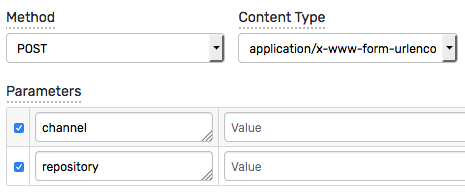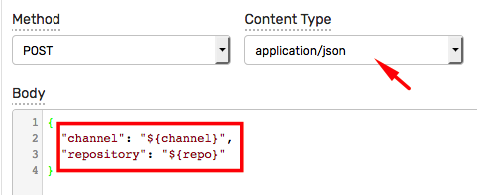Web Query Functions
Overview
These functions execute an HTTP request to an external web service and return a WebRequestResult response object for further processing.
Reference
queryConfig
queryConfig(string name, map params) response
Executes an HTTP request using a predefined outgoing webhook, identified by name (case-sensitive) and returns a WebRequestResult response object.
The webhook name must be listed as enabled on the Alerts > Outgoing Webhooks page.
Parameters and placeholders defined in the webhook are replaced using the input map params.
Available parameters for webhook types are enumerated here.
Content Type is Form
The form-based webhook defines parameters that can be modified in the rule editor.
The values for such parameters are retrieved from the input map params. Unknown parameters in map params are ignored.

queryConfig("rc-hook",
["channel": "devops", "repository": "atsd-site"]
)
The target URL receives the following payload sent as application/x-www-form-urlencoded:
channel=devops&repository=atsd-site
Content Type is JSON
The JSON document defined in the webhook can include placeholders using ${name} syntax.
Such placeholders are substituted with corresponding parameter values from the input map params. Unknown parameters in the map params are ignored.

queryConfig("rc-hook",
["channel": "devops", "repository": "atsd-site"]
)
The target URL receives the following JSON payload sent as application/json:
{
"channel": "devops",
"repository": "atsd-site"
}
queryGet
queryGet(string url, map config) response
Executes a GET request to the specified request URL url and returns a WebRequestResult response object.
The configuration map config can contain the following fields:
headers: Map of request headers keys and values.params: Map of request parameters appended to query string.ignoreSsl: Boolean field that controls SSL certificate validation. Default istrue.
queryGet("https://ipinfo.io/1.1.1.1/json").content
queryPost
queryPost(string url, map config) response
Executes a POST request to the specified request URL url and returns a WebRequestResult response object.
The configuration map config can contain the following fields:
contentType: Content type of the request. Default isapplication/json.content: Request body text.headers: Map of request headers keys and values.params: Map of request parameters.ignoreSsl: Boolean field that controls SSL certificate validation. Default istrue.
The request payload can be specified using either content text or params map.
The params map is serialized into a JSON document if content type is application/json. Otherwise the map is converted to URL-encoded form format.
JSON content type:
queryPost(_url,
["params": ["repository": "atsd-site", "channel": "devops"]]
)
Payload:
{ "repository": "atsd-site", "channel": "devops" }
Form content type:
queryPost(_url, [
"contentType": "application/x-www-form-urlencoded",
"params": ["repository": "atsd-site", "channel": "devops"]
])
Payload:
repository=atsd-site&channel=devops
Request URL
The request URL consists of scheme (HTTP/HTTPS), optional user credentials, hostname, port, and path with query string.
scheme:[//[username:password@]host[:port]][/path][?query]
Examples:
https://john.doe:secret@192.0.2.9:8443/service?load=true
https://api.slack.com/sendMessage
Response Object
| Field | Type | Description |
|---|---|---|
content | string | Response body text. |
status | integer | HTTP status code, such as 200 OK or 401 NOT FOUND. |
headers | map | Response headers. Header values with the same name are separated by a comma. |
duration | long | Time, in milliseconds, between initiating a request and downloading the response. |
reasonPhrase | string | Status line such as OK. |
contentType | string | Response content type, such as application/json. |
WebRequestResult(
content={
"ip": "8.8.8.8",
"country": "US",
"org": "Example"
},
status=200,
headers={
Content-Type=application/json; charset=utf-8,
Access-Control-Allow-Origin=*,
Transfer-Encoding=chunked
},
duration=225,
reasonPhrase=OK,
contentType=application/json; charset=utf-8
)
Response object can be introspected using the printObject function.
printObject(queryPost({}))
+--------------+---------------------------------------------------------+
| Name | Value |
+--------------+---------------------------------------------------------+
| class | class |
| | com.axibase.tsd.model.notifications.WebRequestResult |
| content | {"success":true} |
| contentType | application/json |
| duration | 133 |
| headers | {Access-Control-Allow-Headers=Origin, X-Requested-With, |
| | Content-Type, Accept, Access-Control-Allow-Origin=*, |
| | Cache-Control=no-store, Content-Type=application/json, |
| | Date=Wed, 18 Apr 2018 14:23:56 GMT, Pragma=no-cache, |
| | Server=Caddy, Vary=Accept-Encoding, |
| | X-Instance-Id=gz6wtH9rkYaJpju99} |
| reasonPhrase | OK |
| status | 200 |
+--------------+---------------------------------------------------------+
Examples
Send Request to a Webhook
Posts message to an Incoming Webhook in Rocket.Chat.
queryPost("https://chat_server:3000/hooks/1A1AbbbAAAa1bAAAa/xox-token", [
"params": ["channel": "#devops", "text": "Hello from ATSD!"]
])
Request payload:
{"channel":"#devops","text":"hello world"}
Post Message using REST API
Posts message to Rocket.Chat group using sendMessage REST API method.
queryPost("https://chat_server:3000/api/v1/chat.sendMessage", [
"headers":[
"X-Auth-Token": "botUserToken",
"X-User-Id": "botUserId"
],
"params": [
"message": [ "rid": "GENERAL", "msg": "Hello, Rocket.Chat"]
]
])
Response content:
{
"message": {
"rid": "GENERAL",
"msg": "Hello, Rocket.Chat",
"ts": "2018-04-24T11:31:45.728Z",
"alias": "ATSD BOT",
"u": {
"_id": "userId",
"username": "atsd_bot",
"name": "ATSD BOT"
},
"unread": true,
"mentions": [],
"channels": [],
"_updatedAt": "2018-04-24T11:31:45.731Z",
"_id": "messageId"
},
"success": true
}
Execute a GraphQL Query
Retrieves results of a GitHub GraphQL query.
queryPost("https://api.github.com/graphql", [
"headers": ["Authorization" : "bearer TOKEN"],
"params": [
"query": "{ user(login:\"octocat\") { name login websiteUrl bio company createdAt location organizations(first: 1) {nodes { name loginlocation description websiteUrl url }}}}"
]
])
Response content:
{
"data": {
"user": {
"name": "The Octocat",
"login": "octocat",
"websiteUrl": "http://www.github.com/blog",
"bio": null,
"company": "GitHub",
"createdAt": "2011-01-25T18:44:36Z",
"location": "San Francisco",
"organizations": {
"nodes": []
}
}
}
}
Display Text Content
queryGet("https://ipinfo.io/1.1.1.1/json").content
Response content:
{
"city": "Melbourne",
"location": {
"latitude": -37.7,
"longitude": 145.1833
},
"ip": "1.1.1.1"
}
Convert JSON response to a flat structure
flattenJson(queryGet("https://ipinfo.io/1.1.1.1/json").content)
[
"city" : "Melbourne",
"location.latitude" : -37.7,
"location.longitude" : 145.1833,
"ip" : "1.1.1.1"
]
Display field values in the JSON response in a compact format
concatLines(flattenJson(queryGet("https://ipinfo.io/1.1.1.1/json").content).values())
Melbourne
-37.7
145.1833
1.1.1.1
